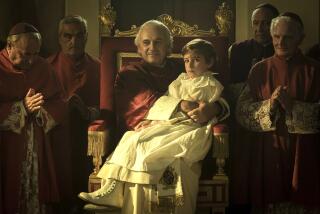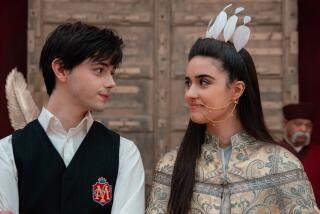THEATER REVIEWS : ‘Amadeus’ Lacks the Vulgar Inner Child
- Share via
COSTA MESA — The rumor that composer Antonio Salieri poisoned Mozart began during Salieri’s lifetime, and has given birth to much speculation. Rimsky-Korsakov based his 1897 opera “Mozart and Salieri” on that rumor and Cedric Glover’s 1964 novel, “The Mysterious Barricades,” also made use of it.
No one has ever taken it seriously, but it makes a good story.
Peter Shaffer uses it in “Amadeus,” his musical fable, but it’s only a point of departure that sets up his ageless moral about the battle between genius and mediocrity. With today’s ears, it’s only necessary to hear a Salieri overture to realize he was by far Mozart’s inferior.
In the play, Mozart and Salieri both know that the younger composer was the master, and that’s what makes Shaffer’s argument. Mozart respects and trusts Salieri’s advice, while Salieri methodically sets out to destroy his brilliant rival in a terror of being eclipsed. Salieri could not compute the genius in the work issuing from what he calls “this vulgar child.”
To make the fable, and the moral, work, Shaffer paints both characters in primary colors. And that’s what leads to the single, but very important flaw in Alex Golson’s otherwise admirable production of “Amadeus” at Orange Coast College.
Both Golson and his Mozart, Gregory Alan Harris, have tried to clean up Mozart (and Shaffer’s) act. Harris’ Mozart is not “the vulgar child,” but an earnest, rather sober-sided young man. Harris even seems a bit uncomfortable at those moments when the dialogue forces him to be vulgar.
*
It’s a shame, because Harris ultimately is impressive, and heartbreaking, in Act II, when Mozart’s gray-cloaked demon directs him to write a Requiem Mass for his own poverty-stricken and debased demise.
Mozart was as Salieri saw him, and is historically accurate, and still lives in Mozart’s giggling and audacious piano sonatas. This white-washed and strait-laced young man may have looked good on paper, but he is no pawn for Shaffer’s game.
Michael Glover Leigh’s well-fed, often amused Salieri is closer to the mark. Leigh’s almost buoyant delight at each of the traps he sets for Mozart, offset by his growing sense of guilt, works very well.
Even with some uneven performances in the supporting cast, Golson provides a period feel that gives the text authenticity, especially on the visually inventive set by David Scaglione, with its two huge statues, and in Donna Mae Dickens’ well-researched costumes.
*
Alan Slabodkin, Christopher Borja and Kelly A. Flynn seem hesitant and unsure as the courtiers who do Salieri’s dirty work, and Flynn, as the Mason who berates Mozart for mocking that order in “The Magic Flute,” goes physically overboard in his chastisement, out of character and period. Jim Carnett is delightful and often funny as Emperor Joseph II, who likes Mozart but follows Salieri’s evil advice.
As Mozart’s put-upon but conspiratorial wife Constanze, Jennifer Ortiz Chapeaud gives an energetic and insightful performance, and Amada Helene is a properly and effectively blank slate as Salieri’s prize pupil Katherina Cavalieri.
* “Amadeus,” Drama Lab Theatre, Orange Coast College, 2701 Fairview Road, Costa Mesa. Thursday through Saturday, 8 p.m.; Sunday, 3 p.m. Ends Sunday. $9. (714) 432-5880. Running time: 2 hours, 30 minutes.
Gregory Alan Harris: Mozart
Michael Glover Leigh: Salieri
Jennifer Ortiz Chapeaud: Constanze
Jim Carnett: Emperor Joseph II
Alan Slabodkin: Von Strack
Christopher Borja: Count Orsini-Rosenberg
Kelly A. Flynn: Van Swieten
Amada Helene: Katherina Cavalieri
Justin Walvoord, Peter Kreder, Salvy Maleki, Jennifer Green: the Venticelli
* An Orange Coast College Theatre Department production of Peter Shaffer’s drama. Directed by Alex Golson. Technical direction/scenic design: David Scaglione. Lighting design: Rick Golson. Costume design: Donna Mae Dickens. Sound design: Alex Golson, Rick Golson. Production stage manager: Paul M. Bennett.
More to Read
The biggest entertainment stories
Get our big stories about Hollywood, film, television, music, arts, culture and more right in your inbox as soon as they publish.
You may occasionally receive promotional content from the Los Angeles Times.










